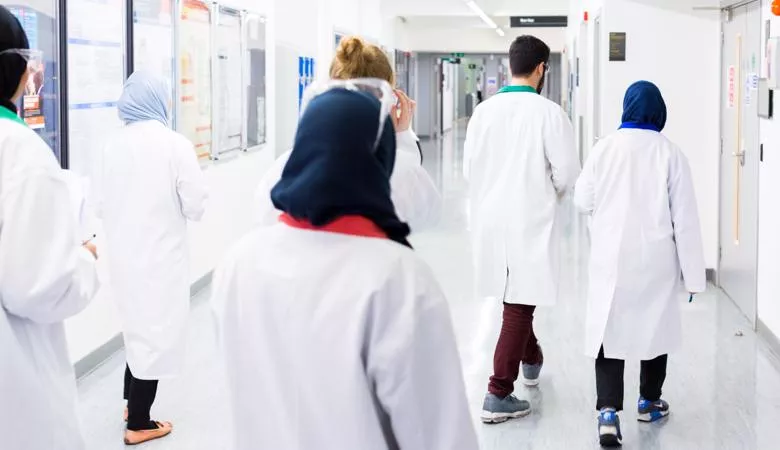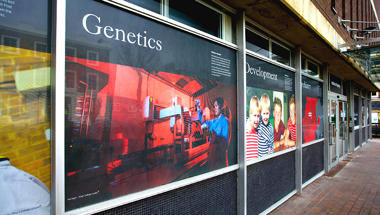Wellcome Trust Neuro-Immune Interactions in Health and Disease
Wellcome Trust Neuro-Immune Interactions in Health and Disease programme...

Cross-talk between the nervous and immune systems is critical for survival, and disrupted neuro-immune communication is observed in many debilitating conditions, including chronic inflammatory, neurodegenerative and psychiatric diseases.
To better understand these conditions, we urgently need a new generation of interdisciplinary researchers that can work across the neuro-immune spectrum. The Wellcome Trust ‘Neuro-Immune Interactions in Health & Disease’ PhD Training Programme is designed to provide the requisite training, using state-of-the-art technologies, cutting-edge science and supervision methods.
In line with Wellcome’s new Research Culture (#ReimagineResearch), we are committed to provide scientific excellence in a positive working environment. Our programme will develop and share practices that bring science and culture together, placing both firmly at the heart of our training strategy and your research journey.
We offer:
6 fully-funded studentships which include a stipend, university fees, research costs, and funds for travel, training and career transitions
world-class scientific training, provided in a flexible, student-led fashion, by interdisciplinary co-supervisor teams
individualised training and support (including financial) to help you transition out of the programme into your chosen career – be it inside or outside of academia
an inclusive training environment: our management team and supervisor pool are diverse and open, and we welcome applicants from communities that are currently under-represented in academia
a positive research culture, which includes training on research integrity and data sharing
Click the 'Study Environment' tab for an outline of the course structure. Please see our programme webpage for more details on projects and supervisors.
Funding for this programme is provided by the Wellcome Trust (5 studentships) and King’s College London (1 studentship). Successful applicants will receive a generous stipend, their university fees in full, research costs, and funds for travel, training and career transitions. See programme webpage for more information.

The Faculty of Life Sciences & Medicine, Faculty of Dentistry, Oral & Craniofacial Sciences, and the Institute of Psychiatry, Psychology & Neuroscience are based at the riverside Guy's Campus, next to the Shard.

Home to the Institute of Psychiatry, Psychology & Neuroscience.
The programme is primarily based at the Guy's campus and secondary at Denmark Hill campus.
Depending on your background, preference and consultation with the programme directors, you can choose one of two pathways through years 1- 4 of this course:
1+3, with three laboratory rotations culminating in an MRes in year 1, followed by a three-year PhD
0+4, consisting of a 4-year PhD with compulsory training elements in year 1
On the 1+3 pathway, you will undertake 12-week rotations in three different laboratories, with projects offered across the neuro-immune spectrum by our interdisciplinary supervisor pool.
On the 0+4 pathway, you will embark straight into your PhD project, which will be co-supervised by one “neuro-“ and one “immune” supervisor.
On either pathway, you will attend 2 bespoke neuro-immune courses, 6 compulsory core research skills and ethics workshops, a weekly journal club, and individualised research and skills training to enhance either your “neuro” or “immune” knowledge, as required.
All students will now be working on their interdisciplinary PhD. Our programme is designed to provide a well-rounded education so, during this time, you will also receive:
Transferrable Skills Training through workshops offered by our Centre for Doctoral Studies, networking and careers events, and public engagement
Flexible Training tailored to your individual needs. This could include undertaking an internship or industrial placement, visiting an external laboratory, or attending an external training course
Throughout your course, you will have the opportunity to connect with PhD students on other doctoral training programmes at King’s (e.g. other Wellcome-DTPs & MRC-DTP) through research symposia, joint social events and student clubs.
Year 5:
Your studentship will include funds to allow you to undertake a tailored transition activity that helps you embark on your chosen post-PhD career path. For example, you could undertake an internship in a company, spend some time to apply for your own postdoctoral fellowship, or attend a training course that would allow you to explore an alternative non-academic career.
Funding for this programme is provided by the Wellcome Trust (5 studentships) and King’s College London (1 studentship). Successful applicants will receive a generous stipend, their university fees in full, research costs, and funds for travel, training and career transitions. See programme webpage for more information.

The Faculty of Life Sciences & Medicine, Faculty of Dentistry, Oral & Craniofacial Sciences, and the Institute of Psychiatry, Psychology & Neuroscience are based at the riverside Guy's Campus, next to the Shard.

Home to the Institute of Psychiatry, Psychology & Neuroscience.
The programme is primarily based at the Guy's campus and secondary at Denmark Hill campus.
Depending on your background, preference and consultation with the programme directors, you can choose one of two pathways through years 1- 4 of this course:
1+3, with three laboratory rotations culminating in an MRes in year 1, followed by a three-year PhD
0+4, consisting of a 4-year PhD with compulsory training elements in year 1
On the 1+3 pathway, you will undertake 12-week rotations in three different laboratories, with projects offered across the neuro-immune spectrum by our interdisciplinary supervisor pool.
On the 0+4 pathway, you will embark straight into your PhD project, which will be co-supervised by one “neuro-“ and one “immune” supervisor.
On either pathway, you will attend 2 bespoke neuro-immune courses, 6 compulsory core research skills and ethics workshops, a weekly journal club, and individualised research and skills training to enhance either your “neuro” or “immune” knowledge, as required.
All students will now be working on their interdisciplinary PhD. Our programme is designed to provide a well-rounded education so, during this time, you will also receive:
Transferrable Skills Training through workshops offered by our Centre for Doctoral Studies, networking and careers events, and public engagement
Flexible Training tailored to your individual needs. This could include undertaking an internship or industrial placement, visiting an external laboratory, or attending an external training course
Throughout your course, you will have the opportunity to connect with PhD students on other doctoral training programmes at King’s (e.g. other Wellcome-DTPs & MRC-DTP) through research symposia, joint social events and student clubs.
Year 5:
Your studentship will include funds to allow you to undertake a tailored transition activity that helps you embark on your chosen post-PhD career path. For example, you could undertake an internship in a company, spend some time to apply for your own postdoctoral fellowship, or attend a training course that would allow you to explore an alternative non-academic career.
For enquiries please contact Wellcome PhD Programme Manager: Dr Fay Minty
Wellcome Trust Neuro-Immune Interactions in Health and Disease programme...
View funded studentships currently available
Want to know more about studying at King's? We're here to help.
King's is right in the heart of the capital.